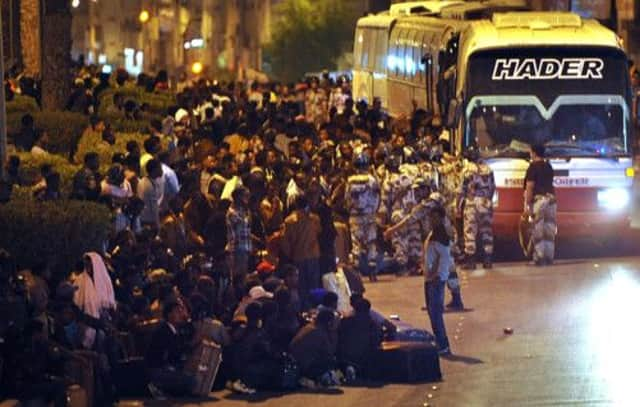Saudi Arabia: Purge of migrants rebounds


Rubbish, previously collected by low-paid labourers, is now piling up around the mosque where the Prophet Muhammad is buried and almost half of Saudi’s construction firms have stopped work on some projects.
Many migrant workers have gone into hiding or are under arrest after a crackdown launched on 4 November began targeting the kingdom’s nine million migrant labourers.
Advertisement
Hide AdAdvertisement
Hide AdDecades of poor immigration enforcement have allowed migrants to take low-wage jobs Saudis shunned for better-paying, more comfortable work.
Now, authorities say repatriating the migrants will open more jobs for Saudis in a bid to tackle a 12.1 per cent unemployment rate.
Since Saudi began issuing warnings earlier this year, hundreds of thousands of foreign workers have been deported, though some have stayed after gaining visas during an amnesty which ended last week. Around 33,000 migrants have been arrested and detained.
With fewer people to do the job, the state-backed Saudi Gazette reported that 20,000 schools are without janitors. Others are without school bus drivers. Rubbish became so noticeable around the mosque housing the Prophet’s tomb that a city official in Medina helped sweep the streets, the state-backed Arab News website reported.
About 40 per cent of small construction firms also have stopped work because their foreign workers couldn’t get proper visas in time, Khalaf al-Otaibi, president of the World Federation of Trade, Industry and Economics in the Middle East, told Arab News. Saudis say dozens of businesses such as bakeries, supermarkets, petrol stations and cafés have closed. And prices have also soared for services from mechanics, plumbers and electricians.
Adam Coogle, a Middle East researcher for Human Rights Watch, said Saudi should look at the employment laws and not at the workers immigration status. Saudi’s sponsorship system, under which foreigners work in the kingdom, gives employers say over whether or not a foreigner can leave the country or change jobs, forcing many into illegal employment.
“The entire system by which Saudi Arabia regulates foreign labour is failing,” he said.
The owner of a multi-million pound construction company in the Saudi capital, Riyadh, said he had to halt all of his projects.
Advertisement
Hide AdAdvertisement
Hide AdHe said he was not the legal sponsor of most of his labourers but that they made more money working freelance.
“These people have worked in this country and their blood is in the stones and buildings,” he said, speaking anonymously for fear of reprisal. “You cannot just, like that, force them out.”
Many Saudis have cheered on the police against the immigrants and some have taken matters into their own hands.
Over the weekend, Saudi residents of Riyadh’s poor Manfouha district fought with Ethiopians, detaining some, until police arrived hours later. Video emerged of a crowd of Saudis knocking on the door of an Ethiopian man’s house, then dragging him out and beating him. A Saudi and a migrant were killed and dozens wounded in the clashes.
“This is not racism or a lack of respect for diversity, but you cannot imagine how much negative comes from these groups instead of positive. These people, every day, cause problems,” said Jiddah resident Abdulaziz al-Qahtani, who posted online video from the Riyadh clashes that he said a friend took.